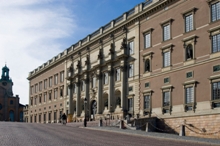Government Donors
Sweden

- © A. Beesley
- The Stockholm Palace, Kungliga Slottet
Sweden and UNESCO have a long-term relationship. Sweden’s support and cooperation with UNESCO have varied over the years. The voluntary contribution to UNESCO’s activities has been increasing, and in 2007, it amounted to USD 9,158,744, bringing Sweden to UNESCO's seventh largest extrabudgetary donor.
UNESCO has a strong extrabudgetary partnership with Sweden, in particular with the Swedish International Development Cooperation Agency (Sida), which has been contributing, since many years, to the support of many priority programmes in accordance with the Organization’s mandate.
Sida
As a governmental agency under the supervision of the Ministry of Foreign Affairs, the Swedish International Development Cooperation Agency (Sida) is responsible for Sweden’s bilateral aid, while contributions to multilateral organizations are channeled partly via the Government Offices and partly via Sida. Therefore not all Swedish Official Development Aid (ODA) is channeled via Sida. Of Sweden's total budget for development cooperation in 2006, SEK 15.9 billion, or 54%, was channeled via Sida.
Sida is working with approximately 120 countries in Africa, Asia, Latin America and Europe.
The Swedish Ministry of Foreign Affairs continues to handle Sweden’s overall aid policy, including regional strategies, and multilateral cooperation.
Development priorities
Sweden's primary goal is to help fight poverty. The Poverty Reduction Strategy (PRS) is the starting point for Swedish development cooperation with a given country. Priorities of Sweden’s development cooperation are:
- respect for human rights
- democracy and good governance
- gender equality
- sustainable use of natural resources and concern for the environment
- economic growth
- social development and welfare
- conflict management and security
- “Global Public Goods”.
The Swedish policy on global development emphasises two main perspectives, namely:
a) the human rights perspectives and
b) the poor's perspective on development
Official Development Aid (ODA) exceeding the UN's target
With an ODA totaling 0,78% of its Gross National Income (GNI) in 2004, Sweden is among the countries that exceed the United Nations target for ODA of 0.7% of GNI. This also puts Sweden among the top countries that give the highest share of GNI for initiatives to end poverty around the world.
Sweden reached an ODA/GNI ratio of 1.03% in 2006 thus ranking first among the 22 Development Assistance Committee (DAC) members. According to the budget bill proposed by the Swedish government in September 2005, Sida's aid appropriation will increase SEK 1.6 billion. The increase will be used for development initiatives in Sub-Saharan Africa and for disaster relief.
In addition, Sweden is at the forefront of the international agenda on harmonisation and alignment, and has been able to successfully implement delegated partnerships with some other like minded donors, such as the Netherlands and Norway.
A Strategy Framework for Working in Partnership with UNESCO
Sweden is also fully committed to achieving the MDGs, and is seeking to have a coherent and coordinated policy approach in its cooperation with multilateral organisations. In this regard, Sida adopted, in 2003, a strategy framework for working in partnership with UNESCO (‘Working in Partnership with UNESCO A Swedish Strategy Framework for 2003-2007’ -pdf file), aiming at enhancing the current partnership.
Since 2004, Sweden is also part of the Utstein Group partnership aiming to coordinate development assistance policies and secure achievement of the Millennium Development Goals.
The main focus of Sweden’s support to UNESCO is on:
- Education: Main contributions are dedicated to the Nordic “Education for All Capacity-Building Programme”, and the the EFA Global Monitoring Report. Sweden has been supporting three of UNESCO’s six education Institutes: the International Institute for Educational Planning (IIEP), The UNESCO Institute of Education (UIE) and the International Bureau of Education (IBE). Sida is also generously financing the Forum on Higher Education.
- Science: After the tsunami disaster, Sida generously contributed to the establishment of a coordinated Indian Ocean tsunami monitoring and warning system.
- Sweden has a long standing programme of cooperation with the International Centre for Theoretical Physics (ICTP), to support talented academics from low and middle income countries.
- Sweden has also been instrumental in assisting UNESCO to follow up issues emerging from the World Conference on Higher Education, Research and Knowledge. This forum is a cooperation linking higher education and the sciences.
- Culture: A new interest for cultural activities has recently been shown for a new project generously funded in 2006 in favour of the development of culture Institutions in Mozambique, for a total amount of SEK 24,000,000 over 3 years (around $2.6 million). In addition, the Intergovernmental Conference on Cultural Policies for Development – the Power of Culture – in Stockholm in 1998, adopted an Action Plan on Cultural Policies for Development, the so-called Stockholm Action Plan. Sweden played a key role in the development of the plan, which presents principles and policy objectives to be adopted by national governments in cooperation with actors at local and regional levels.
During 2006, Sweden has been reviewing its previous strategy on UNESCO.
Geographical Priorities
In line with the poverty reduction objective, least developed or other low income countries are the target of some three-quarters of Sweden’s allocable bilateral aid, over one half of which is assigned to Africa.
Related Links
Nordic+ group joint action plan for effective aid delivery through harmonization and alignment of donor practices (pdf-file)
- 22-10-2008
UNESCO and Sweden sign an agreement to support UNESCO’s extrabudgetary activities for 2008-2009
More


